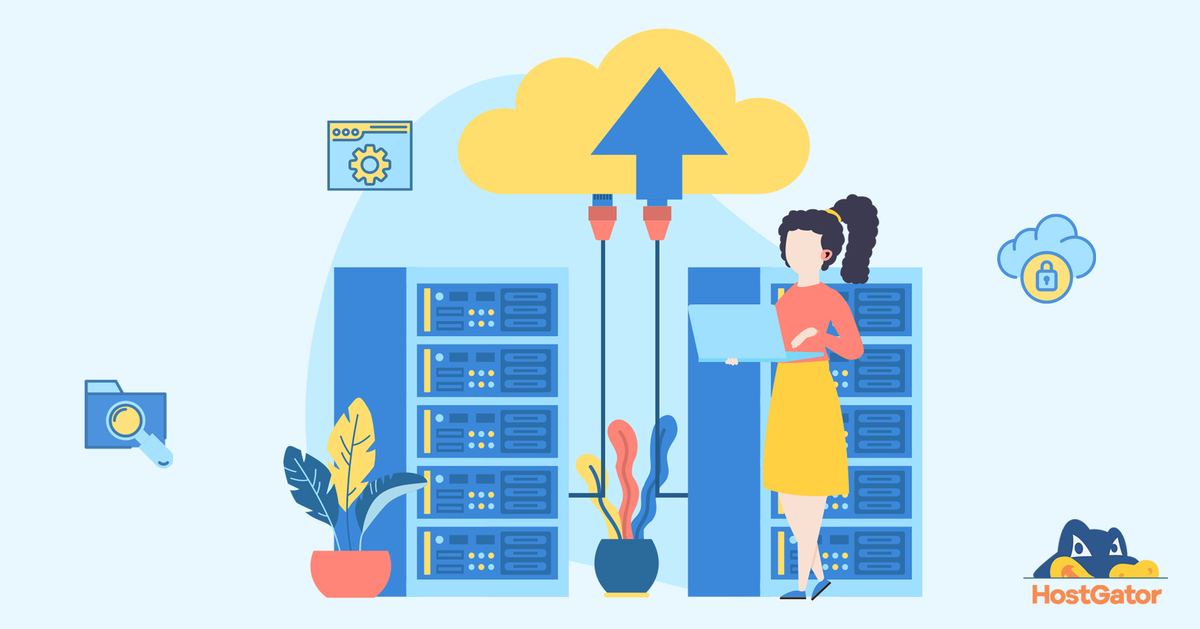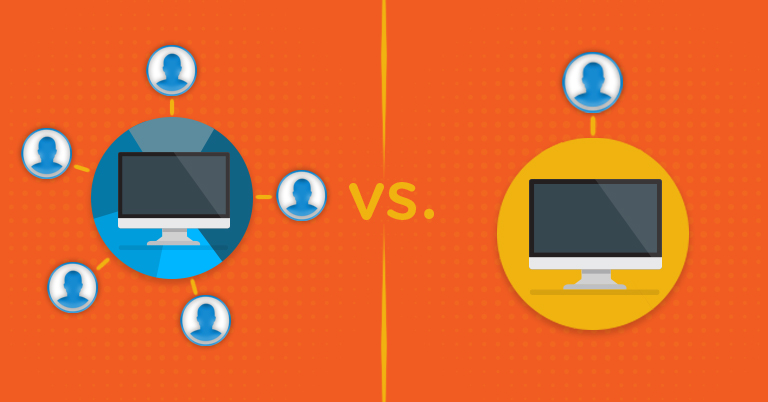The two most popular types of web hosting options you’ll encounter today are shared hosting and cloud hosting. Both have unique advantages, but how do you know which hosting option is better for you and whether it’s time to upgrade to cloud hosting?
Let’s find out.
What is Shared Hosting
Shared hosting is the most common hosting plan on the market. It’s ideal for people and businesses with small websites and limited budgets. In shared hosting (as the name suggests), your website is hosted with many other websites on a single server. This means you share your server resources – such as bandwidth, disk, and storage space – with other websites. Almost all hosting providers offer shared hosting, including HostGator India.
What is Cloud Hosting
Cloud hosting is an increasingly popular hosting option these days. It is ideal for growing and large businesses whose primary focus is performance, security, scalability, and reliability. In cloud hosting, your website is hosted on a physical server that is connected to multiple other servers joined in a cluster (or cloud). Cloud Hosting provides scalability, which means that you can easily add more RAM and CPU to your server.
**The Main Difference Between Shared and Cloud Hosting**
Scalability is the primary differentiator between shared and cloud hosting. It gives your website the ability to perform at optimum. Cloud hosting has other advantages, one of which is data redundancy. All the data from all the servers in a Data Center is stored in a common storage cluster which stores 3 copies of every piece of data written to it. So if your server goes down, the other two copies start re-creating the first copy in a self-healing process. Also, your website will be migrated to another server with minimal downtime.
To help you decide whether you should upgrade, we’ll explain the differences between shared and cloud hosting, as well the benefits of cloud hosting.
1. Performance
Since cloud hosting involves the simultaneous use of multiple servers, your website performs optimally at all times. This type of virtualization ensures maximum performance, uptime, and productivity.
| One of the major issues with shared hosting is that if someone else on the server is using up the bulk of resources, there’s less for everyone else to use. This can result in your website becoming slow (or even unresponsive) – and adversely impact your business by turning away visitors (and therefore leads and sales). Did you know that one out of three businesses 1 suffered from some type of disaster in the last five years – such as network failure, power outages, human error, hurricanes, and flooding? And because it’s impossible to predict the timing of a disaster, the ability to factor for them is one of cloud hosting’s key selling points. |
1 5 Downtime & Recovery Statistics For Your Business To Avoid
2. Scalability
In terms of computing resources, shared and cloud hosting are almost at opposite ends. In shared hosting, the amount of disk space, bandwidth, and processing power are pre-defined. Acquiring additional resources means upgrading to a higher hosting package (shared or otherwise). This means you cannot instantly scale up your resources when the need arises (and cut back when there’s no need).
If (like many businesses) your website needs extra resources due to a spike in seasonal traffic or because you’ve implemented a new functionality, you can run into problems with shared hosting. This can be both inconvenient and costly. Because it means you’ll have to pay more by upgrading your plan (in advance) even though you may not utilize the additional resources in future.
| On-Demand Use of Additional Resources When You Need Them
Cloud hosting offers many benefits over shared hosting – regardless of the nature, size or complexity of your business. Let’s say your resource requirements spike, such as during peak season. No problem! You can instantly provision additional resources (CPU, storage, RAM, etc) – without having to wait for customer service or experiencing downtime or slowness on your site due to increased traffic. As soon as the demand slackens, you can immediately cut back your resource requirements. This saves you a lot of stress – as well as customers – because the process is instant and seamless. |
3. Speed
Many shared hosting platforms provide adequate speeds – depending on other websites on the same server. Because the more a server is shared in terms of the number of websites or traffic, the slower it gets.
On the other hand, a cloud hosting platform automatically distributes the data from your website among several servers (although, compute resources of a cloud hosting package is restricted to one physical server) which significantly enhances the efficiency of your website.
Cloud hosting (therefore) not only helps improve your website’s rankings2 (and therefore traffic) but also:
- positively impacts conversions due to enhanced speed
- reduces website abandonment
- enhances user experience on your website
| Why page speed is so important
According to surveys 3:
|
HostGator India’s premium low-density servers are located in India – as close to your website visitors as possible. This means:
- You get up to 10X faster speeds
- Your customers will not abandon your website thus improving your revenue
2 Google now considers page speed as a ranking factor. This means that (all things being equal) if your website loads faster than your competitor’s website, it will rank higher. Therefore, having a faster website can improve your rankings (and your traffic).
3 https://blog.kissmetrics.com/speed-is-a-killer/
4. Security
You get enough security with shared hosting. But by investing a little more in cloud hosting, you can run your website with absolute confidence. Good hosting providers have high-end security protocols in place to protect databases and applications from common security threats such as malware, DDoS attacks, cross-scripting, etc.
Although you can never be 100% immune to an attack, cloud hosting guarantees more peace of mind in terms of safety and security.
In shared hosting, the risks are on the higher side as many websites reside directly on one server. Even a single malicious file on a server can cross-contaminate other websites on the server especially if your web host hasn’t properly configured their servers (or your website is not running on the latest software, plugins, etc).
On Cloud Hosting, due to the smaller pool of other customers that compete with the cloud hosting package for resources and threats, the risk is significantly minimized.
| Shared hosting plans offered by HostGator India are fully protected – via SSL certificates, anti-virus, anti-spam, DDoS protections as well as additional security plugins, automated malware scans, etc. |
5. Cost
This is the only real drawback of cloud hosting is that it is more expensive than shared hosting. In spite of that cloud hosting and services have witnessed major growth in recent times. More and more businesses are realizing the potential of cloud hosting – and are increasing their investments in it every year.
| Save Money with Cloud Hosting
In cloud hosting, you have the opportunity to add more RAM and CPU whenever the need arises. You can then remove them when not required. Hence, you will only be charged for the additional resources until the time you use them. |
6. Disaster Recovery
If you’re on a cloud hosting plan, mirror copies of your website’s data are automatically (and regularly) distributed across multiple devices. In case of failure or disaster, you can immediately restore your entire server to how it was – without having to manually configure from your backup files.
Summing Up
The major benefit of shared hosting is its low cost (with good security features). The hosting cost is distributed among all the accounts on a server. It makes business sense if you’re just starting out and don’t expect a lot of traffic or aren’t in a position to invest more just yet.
Cloud hosting is an ideal solution for businesses that have outgrown the resources of their existing shared hosting provider – and don’t want to invest both manpower and resources in dedicated hosting just yet. Although it’s costlier than shared hosting, it makes sense for you if your business receives traffic spikes. Visitors expect a fast-loading, high-performing website with maximum uptime (which cloud hosting can offer most cost-effectively). Anything short of this will cost you dearly in terms of leads, sales, security, reputation and business continuity.
Try Cloud Hosting 100% Risk-Free with HostGator India
HostGator India offers the industry’s most powerful cloud hosting plans. Below is a rundown of the 3 plans, along with our recommendation on which plan may be ideal for you.
|
Hatchling Cloud |
Baby Cloud (Recommended) |
Business Cloud |
|
| Cost |
Starts ₹475/mo |
Starts ₹675/mo |
Starts ₹875/mo |
| Ideal for |
|
|
|
| What you get |
|
|
|
Why HostGator India?
HostGator was founded in a dorm room at Florida Atlantic University by Brent Oxley and has grown into a leading provider of Shared, Reseller, VPS, and Dedicated web hosting. Ever since we started our office in India, our team has grown substantially providing our customers with superior (award-winning) round-the-clock support. We’re always available when you need us – via phone, LiveChat or Email.
Turbocharging your website and providing a world-class user experience is very doable with cloud hosting. HostGator India offers unmatched support to give your website the performance, reliability, security and customer support it needs to succeed in today’s hyper-competitive business environment.
Check out how you can launch your website in the cloud with HostGator India today!











